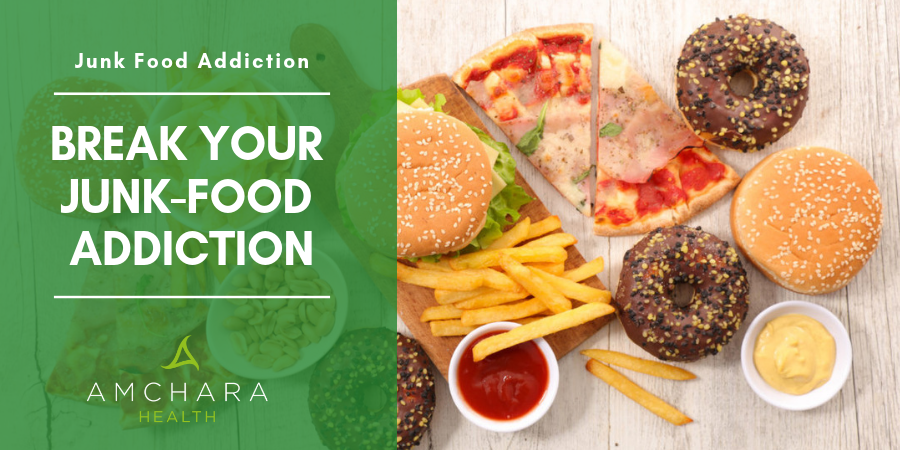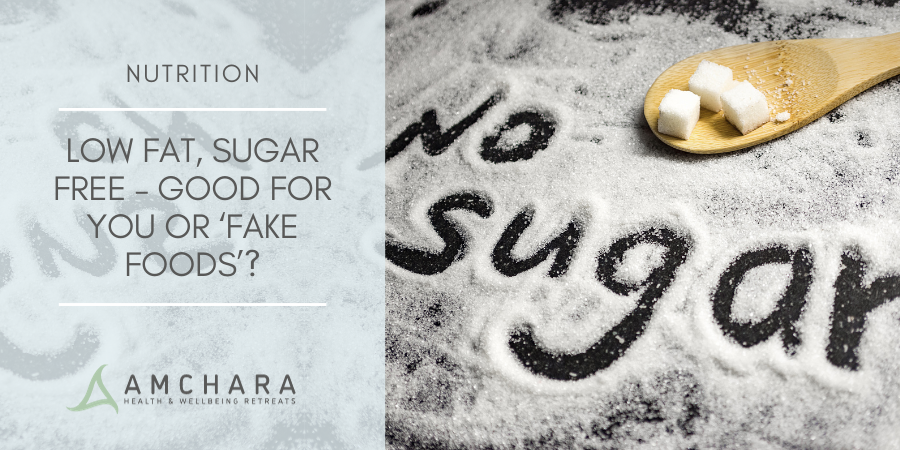Table of Content:
Whenever I eat junk food that is laden with processed ingredients and white sugar, I’m officially on what I call the “junk food train” for a few days.
I generally stick to a diet rich in real foods, veering away from the isles of the supermarket and buying fresh produce as much as possible.
But when the cravings kick in – I’m only human.
“I’ll just have one piece of chocolate” or “a handful of crisps will do” are my final words.
This is all good in theory but minutes later I’ve devoured the whole packet.
Days go past and my mind is still thinking about where I can get my next snack from a rustling packet fix.
The reassuring news is that in admitting this to others, they too can relate to “junk food train” ride.
To understand why most of us have trouble with junk food cravings, I found one study (1) published particularly interesting.
It shows that a study on mice eating high-fat sweetened foods causes chemical changes in the brain which inevitably leads to more cravings of the same or similar foods – even days after initial consumption.
The Junk Food Study:
The study’s results suggest:
That even a short-term exposure to palatable foods can drive future feeding behavior by “rewiring” mesolimbic dopamine neurons, leading to a processed food eating addiction.
This vicious cycle can also relate to humans, whereby we are wired to attain as many calories as possible in order to prepare for moments of famine.
Yet, now that we have easy access to 24 hour supermarkets, restaurants and fast food chains – food is almost always in abundance.
Unfortunately we keep berating ourselves for our perceived lack of self control, as if there is something inherently “wrong” with us.
However, we need to remind ourselves that a lot of junk food manufacturers understand the science behind food.
They understand human nature and create food products in order to ensure we have a pleasurable response once eaten.
Therefore we’re likely to seek more and more and make continuous purchases.
10 Health Foods You Should Be Eating
Making sure that you get a dose of every kind of healthy food can be quite hard sometimes, but what is important to remember is that you should be aiming to get doses of the foods that are most pungent when it comes to staving off disease and supporting your body and its organs.
Foods packed with antioxidants are extremely important in neutralising free radicals and minimising their damage, and this can help to reduce the risk of many severe illnesses and diseases including cancer.
But of course eating an overall healthy diet is most beneficial, in terms of cutting out refined sugars, saturated fats and generally unhealthy processed foods.
We have listed ten of the most important health foods that you should get in your diet – enjoy!
1. Legumes
Legumes are important, especially if you eat a plant based diet.
The reason?
They are high in protein, so if you don’t eat meat, then these little guys can deliver all the protein you need.
Legumes include beans, lentils, peas and peanuts and there are loads to choose from so you can have fun exploring new types that you’ve not seen before.
They are also high in fibre helping to keep the digestive system healthy and contain phytochemicals which recent studies have shown to be extremely important to good health.
2. Kale
Kale is brimming with antioxidants making it a strong cancer fighter, and its high content of vitamin K support healthy blood and healthy cell growth.
This green leafy vegetable also has lots of fibre in it helping to keep your digestive system in good shape.
3. Pumpkin
Pumpkin is a vegetable that is low-calorie but packed full of nutrients, including vitamin A, fibre and beta carotene, which helps the body to fight against heart disease.
This is a great vegetable for roasting in winter and for making into soups or juices that are easy to digest.
4. Blueberries
Blueberries are the kings of fruit when it comes to antioxidant content, particularly carotenoids and flavonoids perfect for keeping a healthy heart and fighting against cancer.
5. Quinoa
Quinoa isn’t just a wholegrain, it is also a complete protein making it ideal for those who eat a plant-based diet.
It has all of the required amino acids for healthy muscles and a strong metabolism.
6. Broccoli
Broccoli is another cruciferous vegetable that is well-known for its ability to help the body fight against cancer.
It also helps to reduce inflammation and is a great vegetable for improving immunity.
7. Chia Seeds
Chia seeds are a great source of plant-based omega 3 fatty acids, much like flax seeds and their natural anti-inflammatory properties help to relieve inflammation in arthritis sufferers.
A benefit is that they do not have to be ground like flax seeds do.
8. Aubergine
Aubergine is a fantastic source of your B vitamins and has plenty of fibre, and its purple colour shows it’s brimming with antioxidants to help fight against cancer.
9. Raw Chocolate/Cocoa
Raw chocolate is rich in an antioxidant called flavonol, and this antioxidant helps to protect against blood clots and keeps blood pressure in check.
10. Extra Virgin Olive Oil
Olive oil contains high levels of monounsaturated fats and is a great food for a healthy heart. It’s vitamin E content also makes for healthy skin
5 Simple Food Swaps
For most of us, our dietary choices are formed through habit and convenience.
With a little more thought and some knowledge on what else is available, we can make better food choices, without compromising on taste and certainly improving on quality and nutritional benefit.
Here is a round-up of 5 of our favourite swaps:
1. All too often, when it comes to choosing a yoghurt, we are led astray by the seemingly appealing ‘Butterscotch Caramel’ or ‘Cherry Bakewell’ for example.
But these flavoured yoghurts are full of added sugars and are of no nutritional benefit to us, as well as typically giving us an energy slump after all that sugar.
Instead try making your own fruit compote to stir into plain yoghurt.
Simply chop your seasonal fruit of choice and place in a pan with 1-2 tbsp of water, a drizzle of honey and 1 tsp of cinnamon and simmer until it is soft.
This is such an easy, healthy alternative that means you get more nutrients and fibre from the fruit you are eating.
2. If crisps are your vice, it’s a tall order to find a replacement for those crunchy, moreish snacks.
Standard crisp are generally made from sliced potato that is covered in a processed vegetable oil with a whole host of added flavours and colourings.
There are now vegetable crisps and healthier varieties on the market but most of them still use unhealthy oils and too much added salt.
Try making your own sweet potato crisps using a julienne grater to slice the potato and then spreading them out on a baking tray and coating in melted coconut oil with a pinch of sea salt and any spices you choose.
Bake these in the oven for around 20 mins on a low heat (160oC) or until cooked through and crispy and enjoy knowing you are getting a healthy dose of antioxidants.
3. There are certain sport’s drink brands that dominant the market for athletes and fitness enthusiasts.
They are high processed and full of unnatural sugar sources. How about opting for nature’s very own, pure, recovery drink in the form of coconut water!
This is a fantastic alternative, full of electrolytes including potassium as well as enzymes, amino acids and antioxidants.
So ditch the synthetic drinks, and opt for the far superior coconut water next time you hit the gym.
4. Cereals have had a hard time in recent years, and for good reason, they are all too often laden with added sugar and sweeteners and the overall product bearing very little nutritional value.
Try making your own by using dates and banana as the natural fruit sweetness base and then adding in your own choice of seeds, nuts and oats.
Alternatively look out for Primrose’s Kitchen Raw Granola which has no hidden nasties and is raw too, so retains all those enzymes and nutrients in their most natural form.
5. Chocolate is a firm favourite for most of us, but when you feel a chocolate craving coming on, think about the quality of the bar you go for.
The most available brands have been around for years and are generally full of sugar and use cheap cocoa ingredients.
There are many more products on the market now offering chocolate that is refined sugar-free, dairy-free and raw – a couple of our favourite brands are Ombar and Conscious.
Although the are substantially more expensive, they are richer in flavour and so you don’t need a whole bar to satisfy that chocolate craving.
A retreat of juice-fasting, raw food or paleo at Amchara, can give your body a break from processed foods in order to quick start the detox process.
We also offer educational talks and healthy food demonstrations by our Naturopaths and raw food chefs, in order to empower you to make mindful day-to-day food consumption choices and are therefore able to avoid the “train ride” as much as possible.
Click here to find out more about our Functional Health programmes.
READ NEXT:
- Control IBS With These 7 Foods
- Is Food Making You Ill?
- Best Liver Friendly Foods to Cleanse Your Liver
- 15 Fabulous foods for reducing blood pressure
- How To Get Started With Raw Food
- Reverse Type 2 Diabetes With A Raw Food Diet
* Reference:
- Consumption of palatable food primes food approach behavior by rapidly increasing synaptic density in the VTA. PNAS 2016;
- February 16, 2016, http://www.pnas.org/content/113/9/2520.short, DOI: 10.1073/pnas.1515724113




